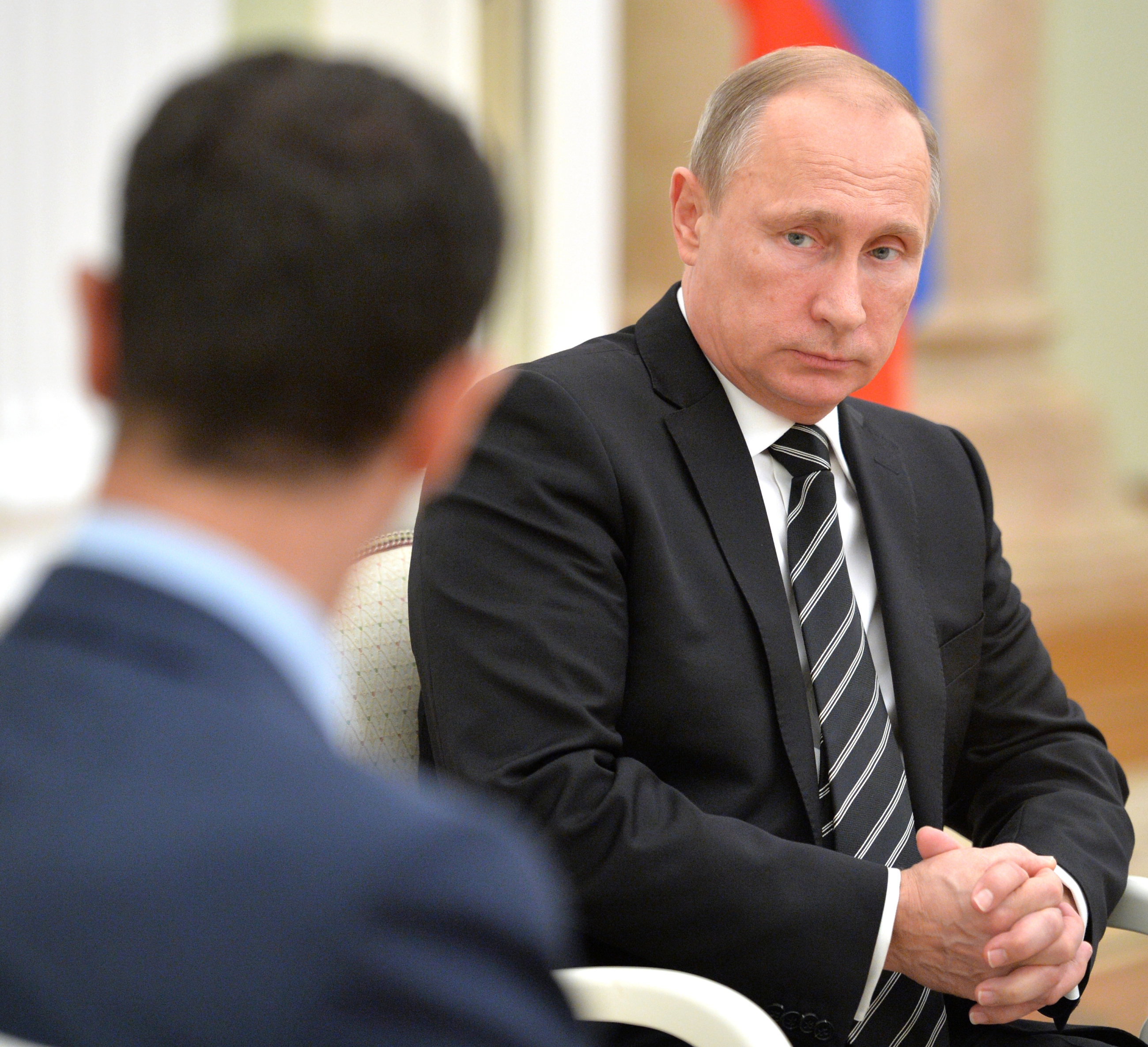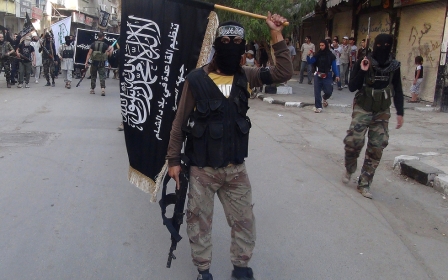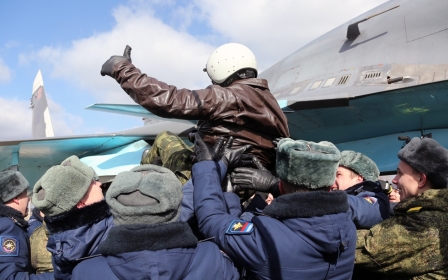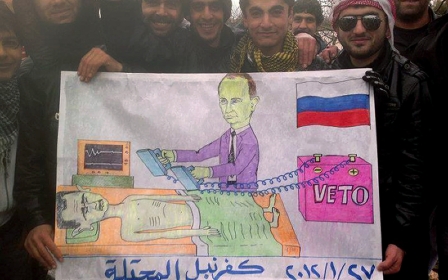ANALYSIS: Enough is enough... Russia's message to Assad

Russia's partial pull-out from Syria does not end its mission but could be seen as a message to President Bashar al-Assad that Moscow wants him to take peace negotiations seriously, according to analysts.
The announcement on Monday by Russian President Vladimir Putin surprised many, with no previous indication of the plans given to the US or NATO.
But Randa Slim, a director at the Middle East Institute, told Middle East Eye that her recent trips to Moscow had left the impression of a growing exasperation with Assad.
"It was becoming clear to them that their objectives in Syria were not necessarily the same as Assad’s,” she said.
“The Russians were angered by Assad’s presidential decree to set 13 April for the elections. They felt that such a decision upended the Vienna timetable [on peace talks] and finally they were very angry with [Walid] Moallem’s ‘red line’ about Assad – setting a precondition when the agreement was there were no preconditions,” she added, referring to the Syrian foreign minister’s statement that Assad’s status as president was a "red line" when it came to peace talks.
“The timing of it is very interesting because it has a messaging function. It tells Assad that ‘enough is enough, you have to enter these negotiations seriously’ and it is also a message to Arab allies and Americans that the Russians are serious about the political process.
“The primary message is to Assad, the secondary message is to the Americans and the Arab governments saying 'we are serious about the political process'. The third message is to the opposition that they should also be serious.”
Assad’s future in Syria has long been a sticking point in negotiations. Opposition leaders maintain that Assad should leave power. Iran and Russia have previously staunchly backed Assad remaining in power as part of a transition government.
“I don’t think [the Russians] would object to the idea of Assad eventually contesting elections, but I don’t see them fighting for it and I don’t think they share Assad’s objectives that he has to regain control over all of Syria,” Slim said.
She added that Russia did believe it had achieved its primary objectives in Syria, and now had to work at getting Assad to the negotiating table.
“Those two objectives, having a role to play in the future of Syria, and not allowing the regime to be defeated militarily as was the case in Libya, I think they believe they have achieved them.
“They are pretty confident that there won’t be an attempt any time soon to unseat this regime militarily, and they feel that they have achieved the status they wanted and everybody has recognised their importance in making this process work.
“[Now], they are basically reigning their ally in. They must feel that he has drawn the wrong conclusions from the Russian military intervention.
“[Assad] in a way took Russia for granted and that is partly what Putin is trying to say: ‘you cannot take us for granted. We are not going to help you achieve control over all of Syria, we are not going to help you not negotiate in good faith, we are not going to help you if you are not serious about the political process.’”
Assad rift with Putin
Speculation about a rift between Putin and Assad has been dismissed by Damascus, which says the two men spoke by phone before the announcement and agreed it was the right time for the move.
"The whole subject happened in complete coordination between the Russian and Syrian sides, and is a step that was carefully and accurately studied for some time," a Syrian government statement said.
Kremlin spokesman Dmitry Peskov also said Putin had telephoned the Syrian president to inform him of the decision.
According to Slim, the long-term implications of the Russian drawdown cannot be predicted, but it could mean that the current "cessation of hostilities" (CoH) continues to hold.
“In terms of regime survival I think Russia wants the regime to survive, Russia might be flexible on the future of Assad, it is yet to be determined, but one long-term prospect is that we are likely to see the CoH stick, in terms of at least Russia not doing the carpet bombing we have seen.”
She added, though, that without Russia’s military leverage being held over him, Assad might start breaching the agreement.
“It will be interesting to see if Assad will start violating the CoH more as a way of showing his displeasure with what Russia is doing. Will its withdrawal mean Russia will lose part of its leverage and we’re going to see Assad more and more prone to violating the CoH? That is something that we have to see whether this will be borne out if the withdrawal is to take place.”
Putin did not say when the withdrawal would be completed, and added that forces would remain at a seaport and an airbase, both in Latakia province.
Speaking in New York, Russia’s UN ambassador, Vitaly Churkin, confirmed both that some forces would remain in Syria, and that the diplomatic team had been ordered to intensify its efforts.
"Our military presence will continue to be there, it will be directed mostly at making sure that the ceasefire, the cessation of hostilities, is maintained," he told reporters at the UN headquarters.
"Our diplomacy has received marching orders to intensify our efforts to achieve a political settlement in Syria."
Olga Oliker, a Russia specialist at the Centre for Strategic and International Studies, said it was possible that leaving some forces behind was giving Russia the option of re-engaging in the conflict if necessary.
“Pulling Russian troops back creates incentives for everyone to stay at the negotiating table, and that is certainly the message that the announcement was sending,” she told Middle East Eye.
“Russia isn’t withdrawing all of its forces, but they are leaving the bases. It may be an effort to show Assad ‘we can ramp this up or down, but go to the table and negotiate’.
“Other people have speculated there is some kind of deal cut with the US, but I haven’t seen anything that indicates that.”
That speculation comes from the fact that President Barack Obama and Putin spoke on the phone before the announcement was made.
The Kremlin said the conversation had been focused on intensifying the political process towards peace, and the White House said Obama had emphasised the need for a political transition in Syria.
“It sounds like Obama put some pressure on Putin to put the Syrian regime in line,” said Oliker. “But I think to a large extent the Russians do feel they have accomplished what they set out to accomplish and also this way they have a very nice story to tell at home about a successful relatively brief military operation with almost no casualties for the Russians.
“If there really is a political process that follows this then it is a tremendous achievement for Moscow.”
Oliker said Russia’s military tactics had helped guarantee them a place of importance at the negotiations, but this would have been the case with or without the withdrawal.
“They did bomb their way to a seat at the head of the table, but they would have stayed there with or without this.
“What the withdrawal does is put pressure on the Assad regime, because they have to be wondering whether or not the Russians will come back in or not.
“If that is the logic I imagine it is something everyone would welcome, which shows that the Russians can act in shared interest.”
New MEE newsletter: Jerusalem Dispatch
Sign up to get the latest insights and analysis on Israel-Palestine, alongside Turkey Unpacked and other MEE newsletters
Middle East Eye delivers independent and unrivalled coverage and analysis of the Middle East, North Africa and beyond. To learn more about republishing this content and the associated fees, please fill out this form. More about MEE can be found here.




